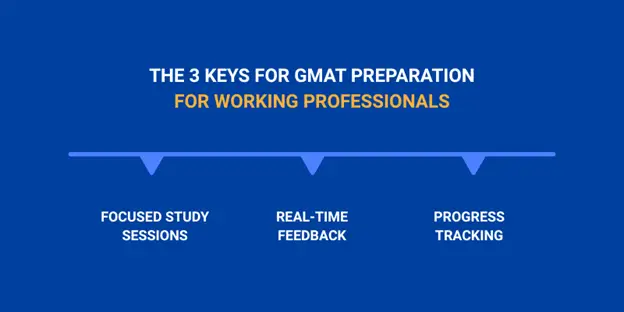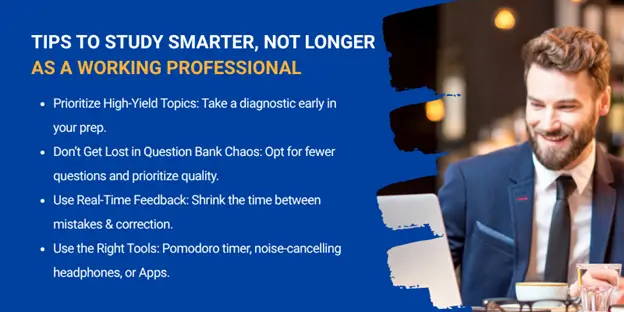Best GMAT Study Plans for Working Professionals

If you’re working full-time and trying to prep for the GMAT, you’ve likely had a stretch like this:
You make a plan. Block off some time. Tell yourself this week will be different.
But then you oversleep. Or work runs late. Or you finally sit down to study but end up scrolling instead.
It’s not that you don’t care. It’s just hard to stay consistent when your days are already full.
That’s not a motivation problem. It’s a structure problem.
In this post, we’ll walk you through a realistic GMAT study plan for working professionals, something that actually works when you have a job, responsibilities, and not much time.
The GMAT Challenge for Working Professionals
Unlike full-time students, you don’t have hours of open time to dedicate to prep.
Instead, you’re balancing a packed 40 to 60-hour workweek plus GMAT study, often on tired evenings or unpredictable weekends.
And that’s hard.
Most working professionals need 4 to 6 months to hit their target GMAT score. Not because they’re less capable, but because their time and energy are more limited.
So if you’ve been struggling to stay consistent or feel like your prep is going nowhere, you’re not alone.
Time Constraints and Cognitive Fatigue
Let’s be real: After a long day of meetings, emails, and decision-making, the last thing you want to do is open up a quant problem set.
You might only have early mornings or late nights to study—but those aren’t always your sharpest hours.
And even if you sit down with good intentions, your focus is already spent.
What’s worse, your schedule can change without warning, with last-minute meetings, work travel, and late deadlines. That makes it hard to build a steady prep routine.
And the GMAT Focus Edition isn’t just a test of knowledge; it’s a 2+ hour exam that demands focus, stamina, and strategy.
Studying in random 20-minute chunks can leave you feeling like you’re not building real test-day readiness.
Over time, that adds up to burnout and frustration.
Why Traditional GMAT Courses Don’t Work for Professionals
When most busy professionals start preparing, they often look at traditional GMAT coaching classes, which typically are conducted two nights a week, 7–9 PM.
Seems structured, right?
But here’s the problem:
- You’re not always free at 7 PM.
- You travel.
- Work runs late.
- You’re mentally done for the day.
And even if you do attend every class, they often throw the same one-size-fits-all syllabus at everyone, chapter by chapter, topic by topic.
That might work if you’re a student with time to spare. But for a full-time worker? That just wastes precious hours.
That said, you don’t need more content. You need targeted focus:
- What are your weak spots?
- Which questions slow you down the most?
- Where can you improve the fastest?
Traditional prep doesn’t answer those questions. And that’s why so many professionals feel stuck, putting in hours but seeing little improvement in their scores.
What Makes an Effective GMAT Plan for Busy People
The best GMAT prep plan with a full-time job must consist of two key elements: a structured approach that you can stick to and flexibility when life gets messy.
You’re not trying to turn prep into a second full-time job. You’re trying to fit it into the life you already have, and still make real progress.
Let’s break down how that actually works.
The Sweet Spot: Predictable Routine + Built-In Flexibility
A good study plan starts with predictability.
With a consistent GMAT study routine for professionals, at the same time each week, the brain gets used to it, and prep becomes a habit, not a struggle.
For example:
- Weeknights: 8:30–9:30 PM
- Saturday mornings: 9 AM–12 PM
That adds up to 10–15 hours a week, enough to build serious momentum. The key is to block these times on your calendar like real appointments.
The 3 Keys: Focused Hours, Feedback, and Tracking
When you don’t have endless hours to study, success comes down to one thing: how well you use your time.
Whether you’re studying 5 hours a week or 15, your GMAT plan should be built around these three core elements:
- Focused Study Sessions
- Real-Time Feedback
- Progress Tracking
Let’s break them down.

1. Focused Study Hours: One Hour of Deep Work Beats Three Hours of Distraction
As a working professional, you can’t afford to study on autopilot. Every session should have a clear goal and full focus.
That means:
- No multitasking
- No background Netflix
- No checking Slack or work emails mid-session
A focused 60-minute session is more powerful than 3 distracted hours.
However, if you struggle to stay focused, try the Pomodoro method: work for 25 minutes, followed by a 5-minute break.
And always prioritize: spend your time on high-yield topics, the ones that move your score the fastest. Thus, don’t waste hours reviewing what you already know well.
2. Real-Time Feedback: Don’t Wait to Find Out What You’re Doing Wrong
The most efficient learners correct mistakes immediately. That’s why feedback should be built into every single session.
Here’s how:
- After a practice set, review every explanation, not just the ones you got wrong.
- Use GMAT prep tools (like Gurutor) that give instant, intelligent feedback when you answer a question.
- Track why you missed a problem: Was it a careless error? A misunderstanding? A timing issue?
Don’t wait for a weekly tutor call or full mock test to realize you’ve been doing something wrong. Good GMAT prep isn’t just about what you study. Feedback helps you catch small mistakes before they become big setbacks. It keeps your study time productive, not just busy.
3. Progress Tracking: See What’s Working, Fix What’s Not
When you’re fitting GMAT prep into a busy schedule, you need proof that your effort is working. That’s where tracking progress comes in.
You can:
- Take a full-length practice test every 2–3 weeks
- Track accuracy across problem types (e.g., SC, CR, DS, PS)
- Use a spreadsheet or dashboard to watch trends
Spot patterns, such as:
- Quant scores stuck? Time to revisit core math.
- Data Sufficiency improving after last week’s focus? Nice, keep going.
- Timing off on Reading Comprehension? Try timed drills.
You don’t need a fancy tool, although many platforms, like Gurutor, offer built-in dashboards. Moreover, review your progress weekly to identify areas where adjustments are needed.
You may not have all day to prep, but when you study this way, every hour counts. And that’s what sets you apart.
Sample Study Plans by Weekly Availability
Not everyone has the same amount of time or energy to prepare each week, and that’s okay.
Whether you’re squeezing in study time after long workdays or saving it for weekends, the right GMAT study plan will meet you where you are.
Here are some sample study plans for working professionals:
1. 5–8 Hours/Week: Weekend + One Weeknight
For professionals with a packed weekday schedule and limited evening energy.
This GMAT weekend study plan is perfect if you:
- Work long hours during the week
- Have just 1–2 short study slots on weekdays
- Can focus better on Saturdays and Sundays
Here’s a weekly breakdown chart of a 5-8 hours/week study plan:
| Day | Time Commitment | Focus Area | Activities |
| Weeknight (e.g., Wednesday) | 1–2 hours | Light review to maintain momentum | Take a timed quiz or mini test. Review incorrect answersAnalyze accuracy trendsReinforce tough concepts |
| Saturday | 3–4 hours | Deep learning + application | Review flashcards or notes, 5–10 practice questions. Revisit mistakes. Watch a short concept video |
| Sunday | 2–3 hours | Practice + reflection | Take a timed quiz or mini test. Review incorrect answers, Analyze accuracy trends, Reinforce tough concepts |
2. 10–12 Hours/Week: 1–2 Hours Daily + Review
If you can set aside 1–2 hours most weekdays and use part of your weekend for review or practice, you’re in a great spot.
This plan is designed for working professionals who want to stay in “GMAT mode” daily without burning out.
With around 10 to 12 hours per week, you’ll build strong habits, keep concepts fresh, and make consistent progress, without needing to cram.
Here’s a weekly breakdown chart of a 10-12 hours/week study plan:
| Day | Time Commitment | Focus Area | Activities |
| Monday | 1.5 hours | Quant – Problem Solving | Practice charts, tables, logic. Focus on timing strategies |
| Tuesday | 1.5 hours | Verbal – Sentence Correction | Learn key grammar rules, Drill SC questions, and analyze mistakes |
| Wednesday | 1.5 hours | Quant – Data Insights | Every other weekend, Full-length mock test + review Alternate weekends Skills sprint on weak areas + review incorrect questions |
| Thursday | 1.5 hours | Verbal – Reading Comprehension | Flashcards during commute. Revisit notes or error log |
| Friday (optional) | 30 min (bonus) | Light review/maintenance | Read 1–2 passages. Answer and review questions. Work on pacing |
| Saturday or Sunday | 4–6 hours total | Practice Test or Targeted Review | Every other weekend, Full-length mock test + review, Alternate weekends, Skills sprint on weak areas + review incorrect questions |
Studying for 1–2 hours most days helps you build a steady routine without feeling overwhelmed.
Thus, breaking prep into smaller daily chunks improves memory and keeps GMAT concepts fresh in your mind throughout the week.
How to Adapt the Plan If You Travel or Work Overtime
Even with the best intentions and a solid study routine, life happens.
Here’s how to adapt your GMAT preparation while working when things get busy:
1. Shift into “Maintenance Mode”
During hectic weeks, lower the pressure. Instead of full study sessions, aim for quick, low-effort activities:
- Review flashcards while commuting or waiting in line
- Do 2–3 practice questions during breaks
- Skim your error log or formula sheet before bed
These 10–15 minute sessions keep your brain engaged without draining your energy.
2. Reschedule and Catch Up Strategically
If you know a busy week is coming (like travel Mon–Thu), plan:
- Add a bit more study time the weekend before
- Use a lighter day later in the week to make up missed sessions
What you don’t want to do is cram on days when you’re already mentally fried.
3. Focus on Essentials Only
When time and energy are low, prioritize what matters most:
- Revisit your weakest areas
- Review past mistakes
- Skip new, complex topics until you have more brainpower
Think of it like shifting to a lower gear; you’re still moving forward, just at a pace that fits the moment.
4. Don’t Let One Bad Week Derail You
The most important mindset? Progress over perfection.
Missing a few sessions or having an off week doesn’t mean your whole plan is ruined. What matters is what you do consistently over time.
5. Communicate and Set Boundaries (If You Can)
If you feel comfortable, let your manager or team know you’re preparing for the GMAT.
You might be able to:
- Leave early one evening per week
- Shift your hours slightly
- Use a personal day before the exam
You’d be surprised how supportive employers can be when it comes to educational goals.
And no matter how busy things get, don’t neglect sleep, movement, or mental breaks.
Study Smarter, Not Longer
When you’re balancing GMAT prep with a full-time job, time is limited, and every hour matters.
The good news? You don’t need to study for 30 hours a week to get a top score. You just need to use your hours better.

Here’s how to study smarter:
1. Prioritize High-Yield Topics
Not all GMAT topics are created equal. Some appear more often. Some give you more points. Others might just feel urgent, but aren’t.
Here’s how to study the right things, not everything:
- Apply the 80/20 rule: Spend most of your time on the 20% of topics that impact 80% of your score.
- Take a diagnostic early in your prep. Identify your weak areas, then focus on them.
- Struggling with Sentence Correction? Make that a priority.
- Already good at basic arithmetic? No need to over-practice.
- Target your personal “high-yield” zones: Your weak areas are where your biggest score gains live.
Pro tip: Make a simple list of 3–5 skills you need to improve most. Revisit them in every session.
2. Don’t Get Lost in Question Bank Chaos
You do not need to solve thousands of questions. In fact, solving too many can hurt more than help, especially if you rush through them without learning.
Instead, go for quality:
- Do fewer questions, but review deeply:
- For each one, ask: Did I understand the logic? Was this a silly mistake or a real gap?
- Log mistakes. Track patterns. Fix them.
- Stick to official GMAT questions or high-quality platforms.
- Mix practice types:
- Short, targeted sets during weekdays
- One-time “test-like” session on the weekend
The goal is not to finish a massive question bank. It’s to learn from every question you ask.
3. Use Real-Time Feedback for Efficiency
Feedback is how you improve. The sooner you get it, the faster you grow.
What does real-time feedback look like for working professionals?
- Use a platform that corrects you on the spot: A prep platform like Gurutor flags mistakes immediately, so you don’t keep repeating them.
- Review right after practice: Don’t save all the review for the weekend. Finish a short set? Check your answers now. Fix it while it’s fresh.
- Ask fast: If you have a tutor or study group, don’t wait days to clarify something. A 10-minute question today saves 2 hours of confusion later.
The goal is to shrink the time between mistake → correction. That’s how you avoid “learning wrong” for weeks.
4. Use the Right Tools to Boost Productivity
When you only have an hour or two to study, the right tools can help you stay focused and make every minute count:
- Pomodoro Timer: Use 25-minute study sprints with 5-minute breaks to boost focus and avoid burnout.
- Noise-Cancelling Headphones: Eliminate distractions in noisy environments, making them especially useful during commutes or in shared spaces.
- Smart App Usage: Use productivity apps like Forest (stay off your phone), Notion (track study goals), or GMAT-specific planners to stay on track.
Why Gurutor Works for Working Professionals
If you’ve made it this far, you already know what it takes to prepare for the GMAT Focus Edition while working full-time: structure, consistency, and smart time management.
Gurutor was built around those exact needs.
Let’s break down why this system works, especially for professionals who are short on hours but serious about results.
Self-Paced, But Guided
Most working professionals don’t have the luxury of a fixed coaching class schedule.
But studying “whenever you can” only works if you also know what to do next. Gurutor gives you both:
- The freedom of self-paced study
- The clarity of a step-by-step system
You’re never left guessing. The platform tells you exactly what to work on, in what order, and when to move on. It adapts to your schedule, not the other way around.
For example, skipped three days because of a work trip? No guilt. Gurutor picks up right where you left off.
This blend of flexibility and structure makes it easier to stay consistent, even with just 5–10 hours of work per week.
Embedded Feedback That Keeps You on Track
When time is tight, mistakes can cost you more than just points; they also waste study hours.
Gurutor fixes that by giving you instant feedback as you practice, so you’re always learning in real time.
- If you take a wrong turn on a question, Gurutor jumps in with a hint before you waste 10 minutes.
- Every problem you solve gets logged. The system tracks your strengths, weaknesses, and the time you spend on each question.
- Your study path adjusts automatically to focus more on what you haven’t mastered yet.
It’s like having a tutor on standby, correcting your course and pushing you forward. Additionally, Gurutor handles everything for you, allowing you to focus solely on improving your score.
Proven Results for Professionals with Limited Time
Gurutor isn’t just theory. It’s working in the real world, for professionals just like you.
For example, one user was stuck at a specific score for months, but saw a jump within weeks using Gurutor’s system.
Another broke through a score plateau after switching from traditional prep to Gurutor’s adaptive method.
These aren’t rare cases; they’re typical of what happens when you stop guessing and start using a proven system that makes every hour count.
Every lesson, every practice set is designed for ROI.
Ready to Prep Like a Pro?
If you’re still reading, you’re not just curious, you’re serious.
Gurutor combines everything we’ve talked about:
- A flexible but structured plan
- Real-time feedback
- Efficient study routines
- Official content
Try the first unit free and see what it feels like to study with a system that’s built for your schedule, not someone else’s.
